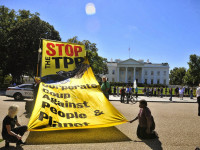President Donald Trump’s Executive Order on domestic safety, released yesterday, has enormous implications for the privacy of everyone living outside the United States. For Canadians, the order should raise significant concerns about government data shared with U.S. authorities as well as the collection of Canadian personal information by U.S. agencies. Given the close integration between U.S. and Canadian agencies – as well as the fact that Canadian Internet traffic frequently traverses into the U.S. – there are serious implications for Canadian privacy. Moreover, the order will raise major concerns in the European Union, creating the possibility of restrictions on data transfers as it seemingly kills the Privacy Shield compromise.
Section 14 of the Executive Order states:
Agencies shall, to the extent consistent with applicable law, ensure that their privacy policies exclude persons who are not United States citizens or lawful permanent residents from the protections of the Privacy Act regarding personally identifiable information.
The protection of Canadian information which ends up in U.S. hands has long been a source of concern. Professor Lisa Austin has written about “constitutional black holes” in which Canadian data is not protected by the Canadian Charter of Rights and Freedoms and the protection afforded to the data in the United States is at a lower standard than for its citizens and permanent residents.











